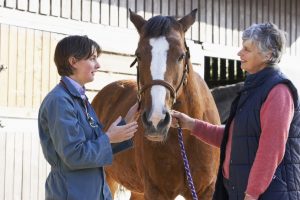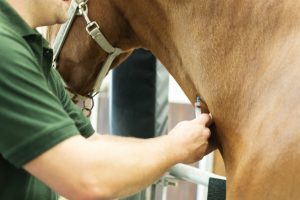Teaching the rules of acceptable behaviour will help keep you – and everyone who deals with your horse – safe, writes Carolyn Henderson
Imagine that two friends have each asked you to spend a day with them. One is great fun and you enjoy her company, but she doesn’t always listen to others’ points of view and can be a bit pushy and in-your-face. The other is also great fun but has inherent good manners and respects your views and personal space. Which one would you prefer to be with? It’s a no-brainer, unless you’re up for an exhausting challenge. So, why do so many people allow their horses to have bad manners? It’s annoying, unnecessary and can be dangerous.
Although figures can’t be quantified, most organisations agree that accidents happen on the ground just as frequently as when horses are ridden or driven. One reason might be that we become complacent and take good behaviour for granted. I learned that the hard way. Many years ago, I forgot my gloves when preparing to lunge a saint on four legs and couldn’t be bothered to go back for them.
Unfortunately, even saints spook when birds fly out of the hedge. My horse took off, the lunge line ripped across my fingers and a finger joint ended up at an angle it wasn’t designed to take. I can’t guarantee that gloves would have prevented the injury, but I reckon they would have minimised the damage.
Our responsibility as owners is to everyone who comes into contact with our horses. Vets are particularly vulnerable, for obvious reasons, which is why the British Equine Veterinary Association has launched its Don’t Break Your Vet campaign. Did you know that equine vets have one of the highest injury risks of all civilian professions? According to a paper recently published in the journal Equine Veterinary Education, an average equine vet may expect to sustain between seven and eight work-related injuries that impede them from working, during a 30-year working life. This is far a higher figure than civilian occupations such as the construction industry, prison service and the fire brigade!
My vet won’t be surprised – last year, he was kicked and knocked out by an unshod youngster. That’s why we must all teach our horses basic manners. They must stand still when required to; walk and trot in-hand obediently; accept a worming syringe; and respect a handler’s space. As part of its campaign, BEVA has produced some great short videos. They are practical, logical, and use kind methods, without any mysticism. Anyone can learn the techniques and apply them to their horses and ponies and any animal can learn what’s asked.
You often hear excuses such as “He’s feisty, all Welsh/TBs/Arabs/cobs/substitute your favourite breed or type are like that.” Sorry, that doesn’t work. A reactive horse can learn just as easily as a laid-back one – in fact, he’ll pick things up more quickly and will enjoy doing it. If a horse has been badly or inconsiderately treated, then of course you might need extra patience. In some cases, you might want to get help from a recommended professional – but be careful that he or she has the pedigree to match the selling pitch.
But whether you’ve got a stroppy pony or a clever cob who’s good at manipulating you, it’s well worth watching the series of videos made by BEVA. Whenever you have a problem, it’s sensible to look at your overall regime. Is a horse over-reactive because his feeding or management regime has been changed, or doesn’t suit him? Is he bored and needs more stimulation? Practising new skills via short training sessions will help here, too. Brush up your skills and let us know how you get on – and if you’ve worked to improve your horse’s manners, we’d love to hear about them and how you did it.



